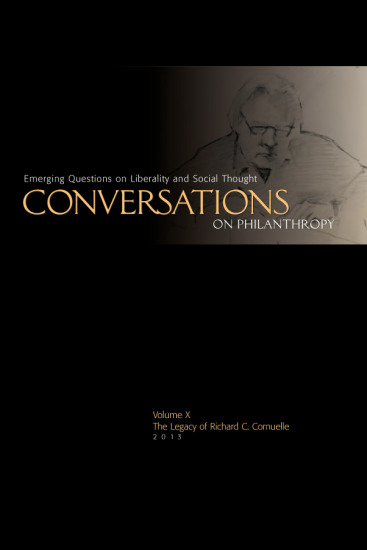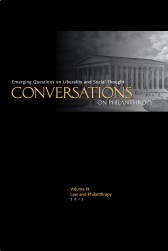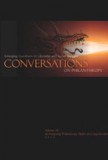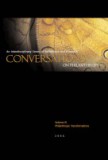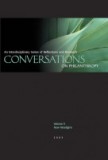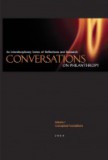Interested in learning more? Subscribe to our mailing list.
Conversations on Philanthropy is an annual publication of The Philanthropic Enterprise. Seeking to ignite reflection and discussion on the role of beneficence in the social order, Conversations features academic papers, essays, and reviews by scholars, philanthropists, and social entrepreneurs

Volume I Conceptual Foundations, 2004
Download the entire journal as a PDF ![]()
This inaugural volume of Conversations on Philanthropy: An Interdisciplinary Series of Reflections and Research is titled “Conceptual Foundations,” but it could have as easily been called “Reclaiming the Public.” Our authors were asked to reflect on the state of contemporary economics and political philosophy and to consider what foundations these disciplines might provide in launching a series of conversations about the role of philanthropy in a free society.
What emerged from these considerations is an intriguing riff on the ambiguities of the term “public.” Our authors variously speak of public goods, public virtues, and public values and the ways that they can be provided, cultivated, and made manifest. What is clear from these layerings of the term “public” is that the term itself has either outlived its analytical usefulness or is pregnant with a new meaning that needs yet to be born. Read More...
ZOLTAN J. ACS is the Doris and McCurdy Distinguished Professor of Entrepreneurship at the University of Baltimore. His research interests include the role of entrepreneurship in innovation, economic development and social and historical development. He is the author of twenty books including Entrepreneurship, Geography and American Economic Growth, Cambridge University Press 2005, and Entrepreneurship and Philanthropy in American Capitalism, Small Business Economics. He is the recipient of the Swedish award for Research on Small Business and Entrepreneurship in 2000, and the editor of Small Business Economics.
PETER J. BOETTKE is Professor of Economics at George Mason University, where he is also the Director of Graduate Studies and a Senior Research Fellow at the Mercatus Center. Boettke is the editor of the Review of Austrian Economics. He is also the author of numerous articles in the professional journals and has authored several books, including The Political Economy of Soviet Socialism, Why Perestroika Failed, and Calculation and Coordination.
EMILY CHAMLEE-WRIGHT is Associate Professor of Economics at Beloit College. She is author of The Cultural Foundations of Economic Development (Routledge 1997) and coauthor of Culture and Enterprise: The Development, Representation, and Morality of Business (Routledge 2000) with Don Lavoie.
ROGER A. LOHMANN is Professor of Social Work and Benedum Distinguished Scholar at West Virginia University and the Editor of Nonprofit Management and Leadership. He is the author of numerous journal articles, and author of three books: Breaking Even: Financial Management in Human Services; The Commons: New Perspectives on Nonprofit Organization, Voluntary Action and Philanthropy; Social Administration (co-authored with Nancy Lohmann) and co-editor (also with Nancy Lohmann) of Rural Social Work Practice. He is the founder and operator of ARNOVA-L, CGAP-L, and 20 other electronic discussion lists. He is currently involved in creating a research and training center focused on sustained dialogue, public deliberation and other approaches to public talk.
DAVID L. PRYCHITKO is a professor of economics at Northern Michigan University and faculty affiliate in the Program on Markets and Institutions of the James M. Buchanan Center for Political Economy. Formerly a visiting fellow in the Program on Participation and Labor-Managed Systems at Cornell University, and Fulbright fellow at the University of Zagreb, he was most recently awarded the Green Honors Chair in Economics at Texas Christian University for 2003-2004. Prychitko has published widely in economics, and is the co-author (with Paul Heyne and Peter Boettke) of The Economic Way of Thinking, an introductory textbook published by Prentice Hall.
RICHARD STROUP is professor of economics and interim department head at Montana State University and a senior associate of the Property and Environment Research Center (PERC). During the Reagan administration, Stroup served as the director of the Office of Policy Analysis at the Department of Interior. He is a widely published author and speaker on economics, including natural resources and environmental issues. His books include the recent primer on economics, Eco-Nomics: What Everyone Should Know About Economics and the Environment, and a leading economics principles textbook, co-authored with James D. Gwartney, Economics: Private and Public Choice, now in its tenth edition.
GUS DIZEREGA is the author of Persuasion, Power and Polity: A Theory of Democratic Self- Organization (2000). He is a leading theorist of evolutionary liberalism, a liberal ethic regrounded in awareness of our relationship with the earth, with all life, and with Spirit and growing in appreciation of how self-organizing systems actually work. He holds a Ph.D. in political science from the University of California at Berkeley and currently teaches in the Department of Government at St. Lawrence University.
STEVEN D. EALY is a Senior Fellow at Liberty Fund, Inc., an Indianapolis-based educational foundation. He previously taught at Western Carolina University and Armstrong Atlantic State University. He has published on Jurgen Habermas, bureaucratic ethics, the Federalist Papers, and Robert Penn Warren.
GORDON LLOYD earned his bachelor’s degree in economics and political science at McGill University. He completed all coursework toward a doctorate in economics from the University of Chicago before receiving his master’s and Ph.D. degrees in government at Claremont Graduate School. The co-author of three books on the American founding and author of two forthcoming publications on political economy, he also has numerous articles and book reviews to his credit. His areas of research span the California constitution, common law, the New Deal, slavery and the Supreme Court, and the relationship between politics and economics.
EUGENE MILLER is Professor Emeritus of Political Science in the School of Public and International Affairs at the University of Georgia. He has written extensively on the history of political philosophy and American political thought. He approaches issues of philanthrophy in light of his broader interests in moral philosophy, political epistemology, and technology and politics. He is editor of the Liberty Fund edition of David Hume's Essays Moral, Political, and Literary.
—Peter J. Boettke and David L. Prychitko
Introduction
Nonprofit organizations have traditionally been considered a legitimate alternative source for the services provided today primarily by the bureaucratic welfare state (Berger, Neuhaus, and Novak, 1996). Taken together, nonprofit organizations can be viewed as a vibrant but largely “independent” sector characterized by a spontaneous ordering of associations that are founded neither on the state’s compulsory power nor on the capitalist’s search for private monetary profit (Cornuelle, 1965). In an extensive body of work, however, Lester Salamon, one of the leading scholarly investigators of nonprofit organizations, questions the “independence” of the sector. 1 Salamon argues that the U.S. has a long, established history of efficient institutional linkages between the nonprofit sector, which he calls the “voluntary sector,” and the state. Rather than a substitute or alternative source of services, Salamon sees nonprofits as being in an effective “partnership” with the state, a viable form of “third-party” governance. He argues that the independent sector is, in fact, not so independent, and that on its own it is prone to failure. Salamon points to the aftermath of the September 11th attacks as evidence: Read More...
Peter J. Boettke and David L. Prychitko provide a valuable contribution to the debate on the relationship between the compulsory power of the state, the capitalist search for private monetary profit, and the spontaneous ordering of associations—the nonprofit sector. While there is general agreement across the political spectrum that the nonprofit sector plays an important role in American society, the exact nature of that role is in dispute. Read More...
By challenging the condition of Pareto Optimality as the benchmark against which the voluntary sector is compared, Boettke and Prychitko make an important correction in the literature on the philanthropic process. In addition, their analysis of the relationship between the state and the voluntary sector sends a chilling warning. State funding of nonprofit organizations may ultimately erode the voluntary sector’s ability to serve as a check on government power. Further, I agree with the authors that Austrian economics has much to contribute to our understanding of the philanthropic process, and it is on this point that I wish to devote the substance of my commentary. Read More...
I appreciate very much the opportunity to provide written reaction to the Boettke-Prychitko paper “Is an Independent Nonprofit Sector Prone to Failure?” It is one of the most basic rewards of intellectual effort in the crowded contemporary marketplace of ideas to have one’s ideas noticed. Today’s scholarly world of surplus production of papers, articles, and books produces something of a hierarchy of notice: to have one’s work noticed at all is good and more rare than one might otherwise anticipate; to provoke a reaction is even better, and when that reaction is both critically ambitious and favorable, one has perhaps the best reward possible. Read More...
Boettke and Prychitko undertake a large mission here, especially in the latter portion of their title. In the narrow sense their paper is a critique of the work in this topic area by Lester Salamon, who writes of the failure of the nonprofit sector and calls for more explicit partnerships of nonprofits with government. They make many valid and important points against Salamon’s views along the way. He has, it would appear from their critique, failed to show that the sector has failed, and he fails to show that explicit government-nonprofit partnerships would in fact do better. They do make their case on this, bringing in other elements from the literature in doing so. It is a useful paper. Read More...
—Steven D. Ealy
This paper addresses the question, “Why does the political solution to social problems appear to be the default position in contemporary America?” A complete answer to this question would take us to the heart of the dynamic of American society, and would involve considerations of historical development, contemporary politics, and political philosophy. An answer to this question is central to any effort to move away from government and toward independent voluntary action as a means of dealing with social and community problems. An alternative to the default move to government control is crucial if philanthropy is going to have an independent life of its own as opposed to simply being one more piece of equipment in the political toolbox.
A complete answer to the question at hand is not provided here; rather, I deal with one component of the problem. This paper approaches the subject not by examining contemporary attitudes or the immediate historical framework for the development of American philanthropy, but by examining how political philosophy frames our understanding of social life. Read More...
I agree with Steve Ealy’s goal of moving “away from government and towards independent voluntary action [for] dealing with social and community problems,” and with his belief that philanthropy can be a powerful independent force in meeting this challenge. Political theory plays a central, yet so far not very helpful, role in how we think about these issues. When freed from its appropriation by statists, political theory offers us some insights vital for our task. In particular, I want to rescue the concepts of the “political” and the “public” from their current association with coercive government. Re-examining Aristotle gets us started. Read More...
Steven Ealy’s provocative essay addresses core issues of politics and philanthropy and, in doing so, shows that intelligent discussion of these issues requires close attention to our use of language. In fact, his substantive thesis revolves around the claim that modern thinking about politics and philanthropy is misguided precisely because of the language in which it is framed: specifically, the language of politics that modernity inherited from the ancient Greeks. In Ealy’s view, this traditional language has a built-in “psychology” or “resonance” that compels us to think about politics very much along the lines of the Greek political philosophers—a way of thinking that is both inappropriate and dangerous in a world where the modern state has replaced the ancient polis. In developing his thesis, Ealy takes note of some of my own reflections about the analogical uses of political language, but he draws a conclusion from them that is quite different from the one intended. My remarks will speak to the linguistic and substantive issues that Ealy raises. Read More...
Steve Ealy invites us to reject what he calls “the prejudice of political philosophy.” He states his purpose clearly: “The burden of this paper is to deal with the twin prejudices of political philosophy—that political institutions should be the most authoritative and that the political system has the...responsibility for shaping the moral life of its citizens—and to show that these positions do not fit well with the nature of modern society.” But Ealy’s “burden” is, in fact, more than the effort “to show that these positions do not fit well the nature of modern society.”
The controversial core of Ealy’s paper is his claim that these twin positions are (1) actually prejudicial to the very philanthropic enterprise per se and (2) that the Progressives’ project and that of political philosophy are much closer than we have heretofore appreciated. Put differently, Ealy’s claim is that the alternative to the Progressive, statist agenda is not to be found in political philosophy, because political philosophy is the problem rather than the solution. Read More...

